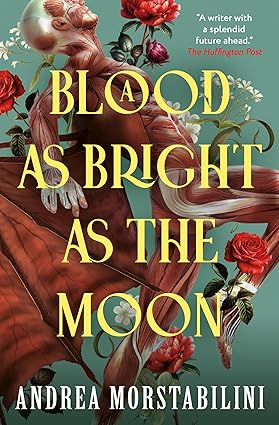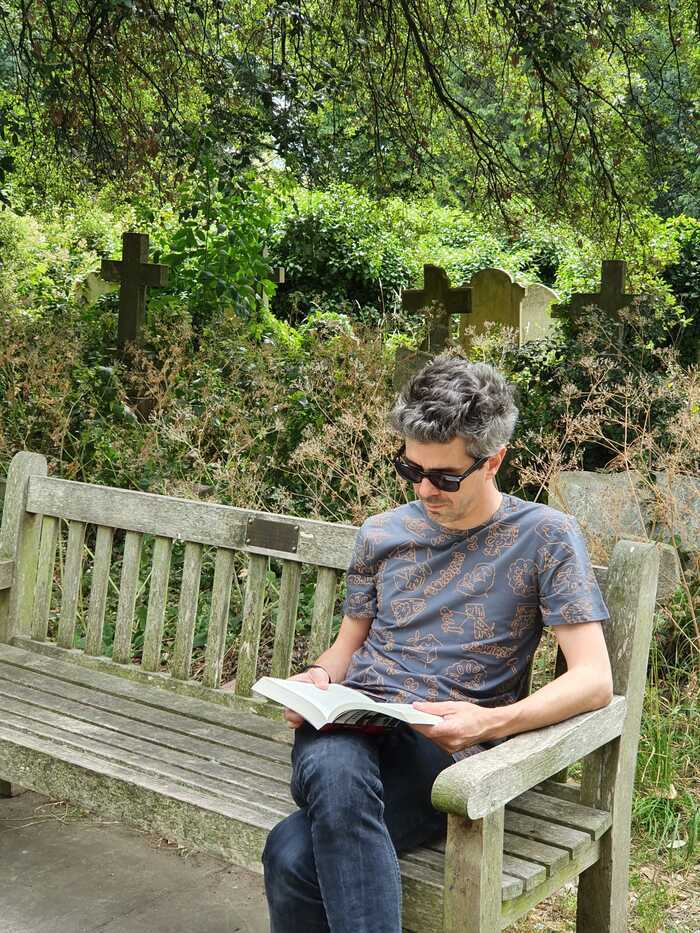A Blood as Bright as the Moon, by Andrea Morstabilini
17 Sept 2025The Book

Synopsis:
A vampire, desperately torn between worlds, is hunted down by a secret society bent on his destruction, in this elegiac and unsettling queer gothic horror, perfect for fans of T. Kingfisher and Silvia Moreno-Garcia.
Frankenstein, Germany. Ambrose, a young vampire, lives a life secreted away from the modern world with the rest of his clan, all of them under the spell of the charismatic Regina, who spins stories of salvation for their kind. Their grand plan? To build makeshift wings and fly to the moon where a safe haven awaits for all vampires.
But Ambrose harbours a secret: he is not ready to abandon the earth, and he is in contact with a human who believes he can be saved. As the rest of his kind prepare to flee their home, Ambrose is torn between loyalties.
However something else is on the horizon – the Royal Diurnal Society – a group with sinister plans for vampires, are closing in, and if Ambrose isn’t careful, he could find himself right at the centre of a terrifying and mysterious experiment.
My Review
A Blood as Bright as the Moon is a queer gothic horror novel, written by Andrea Morstabilini and published by Titan Books. An interesting and different take on vampires, with a lyrical prose that uses each one of its acts to experiment with the narrative in a different approach, all to deliver a powerful piece with an excellently fleshed main character enveloped into a world that spirals out of his control.
Ambrose, a young vampire, lives a secreted life with the rest of his clan, isolated from the modern world in a castle, under the direction of Regina, who also spins stories about how their group will get redemption; a sort of religion articulated around flying to the moon with makeshift wings, a safe heaven for the vampires. However, Ambrose is not ready to abandon earth, being torn between loyalties, as he's in contact with a human that thinks he might be saved; a first act that reaches its conclusion with the appearance of the Royal Diurnal Society, and with Ambrose being captured.
A first act that in, terms of structure, atmosphere, and tropes, fits well with the gothic genre, developing Ambrose as a character, and putting us in the shoes of this vampire that is still doubting about his beliefs; how being queer in this world brought pain to him, but there's still hope for his salvation.
A second act that shifts to the second person, following the Royal Diurnal Society and their deliberations after capturing Ambrose; by moments, using a theatrical approach to the narration. A part that tries to mimic the Illumination, their approach towards medical science with a certain amount of flawed takes; the conflict between rationality and religion, all while inflicting more pain to Ambrose. An act that ends with a glorious conclusion to this discussion among vampire hunters.
And again, the third and final act changes the paradigm, divided between how Ambrose finally passes to be the hunter, but also accepts how he is, but also we get to know the foundational myths of the cult lead by Regina: a new gothic tale inside our own novel. It's not as powerful as the previous acts, but there's still interesting passages, and Ludwig's story gives Morstabilini's prose an opportunity to shine.
Overall, A Blood as Bright as the Moon is a really different proposal, and that's partly why it's such an excellent novel; a new take on a classical motif as the vampire while still having that heavy gothic atmosphere engraved into the text. A memorable debut that puts Andrea Morstabilini as a voice to watch.
The Author/s

Andrea Morstabilini
Andrea Morstabilini was born in Lodi, in the misty middle of the Po Valley, in Northern Italy, in 1983. He studied Modern Literature at the University of Milan with a thesis on the Fantastic in late 19th century Italian literature. He (predictably) loves Gothic novels and architecture, the theatre, cats, and cemeteries. A Blood as Bright as the Moon, forthcoming from Titan Books, is his English-language debut. He is the author of two previous novels in Italian and various essays and short stories. He also works as an editor. He lives in Milan, and sometimes Kraków, with his husband.
